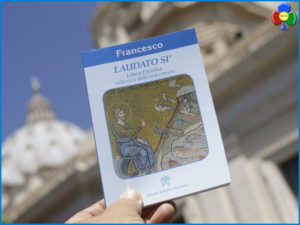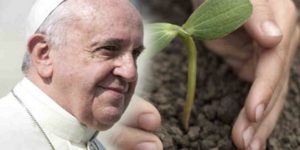 The encyclical Laudato si’ of Pope Francis, a document which is at times moving, pays a great deal of attention to the illnesses of the globalised planet and to relationships with patients. It is an invitation to rediscover the values of Hippocrates.
The encyclical Laudato si’ of Pope Francis, a document which is at times moving, pays a great deal of attention to the illnesses of the globalised planet and to relationships with patients. It is an invitation to rediscover the values of Hippocrates.
The encyclical letter Laudato si’ of Pope Francis begins (point 2) with observations about ‘the symptoms of sickness evident in the soil, in the water, in the air and in all forms of life’. This seems a reference to the ancient medicine of Empedocles, the philosopher of Agrigento, and of Hippocrates, the father of the ‘art of treating’: the four primordial elements that made up the foundation of the cosmos – air, water, earth and fire (this last ignited in the sun and volcanos) – assured, if ordered, the harmony of the body as well, or vice versa, if upset, caused it to be ill. ‘The most extraordinary scientific advances, the most amazing technical abilities’, observes the Pope (point 4) ‘unless they are accompanied by authentic social and moral progress, will definitively turn against man’.
Against the ideology of technology
The application of science to technology and of technology to medical practice has constituted, together with the welfare society with its right to fairness in treatment, that ‘extraordinary’ and ‘amazing’ technological revolution of medicine that has allowed the acquisition of a greater quantity of life and a greater quality of that life.
Today, in the north-western countries of the planet, you live longer and are better cared for. But all of this has involved, and involves, risks which, if they are not perceived or are consciously neglected, have provoked, and still provoke, in these countries themselves, or at least in ours, a socialisation of services to the person which are often damaged by bureaucracy and a medical technology that has often been transformed into an ideology of technology, which, in turn, becomes technocracy. A consequence of this is the closing of the spaces that are due to man, with an abandonment of the safeguarding of what Pope Francis (point 5) calls ‘authentic human ecology’. Like the ‘natural environment’, the Pope than observes (point 6), ‘The social environment has also suffered damage’. Nature and society are two dimensions in a single human world.
Nature and society
Man, physicians once said, is affected and afflicted both by the ‘mistakes of nature’ and by the ‘disorders of society’.
In this papal letter one reads references both to the very many new genetic diseases that crowd hospitals and to the old and always new social scourge of miseria morborum genetrix, which good medicine of every age and every place has indicated, and indicates, as being the primary cause of illness for vast swathes of the population who are in lasting poverty.
Hence the suggestion, which emerges from the words of the Pope (point 11), that in the medical/health-care field, as well, ‘integral ecology calls for openness to categories which transcend the language of mathematics and biology, and take us to the heart of what it is to be human’. Medicine, which is based upon science – on biology, chemistry and physics which strive towards exactness – is exercised in a context of values where man is at the centre. Without a reference to this relational anthropology, between a medical doctor and his or her patient, medical technology can achieve a precision of knowledge but abandon understanding of humanity and in this way lose from sight its own purpose.
 Thus a medical doctor, self-reduced to being a technician, loses his or her identity of treating and his or her ‘attitude’ (once again these are the words of the Pope) ‘will be that of masters, consumers, ruthless exploiters’, clinging to his or her power and not a dispenser of his or her knowledge at the service of man. Entering the pathological problems of our times and our latitudes, Pope observes (point 20) that ‘People take sick…from breathing high levels of smoke’.
Thus a medical doctor, self-reduced to being a technician, loses his or her identity of treating and his or her ‘attitude’ (once again these are the words of the Pope) ‘will be that of masters, consumers, ruthless exploiters’, clinging to his or her power and not a dispenser of his or her knowledge at the service of man. Entering the pathological problems of our times and our latitudes, Pope observes (point 20) that ‘People take sick…from breathing high levels of smoke’.
The throwaway culture
He does not mention, perhaps out of discretion, cigarette smoke which for many people constitutes a sort of placebo, but, rather, points his finger at ‘a pollution that affects everyone’ and (point 22) unleashes arrows against the ‘throwaway culture’ which fills bins with food rejected by a super-abundant pre-consumerist alimentation that is often the cause of obesity.
If obesity deserves the name ‘globesity’, placing itself at first place amongst global epidemics, the ‘throwaway culture’ that is denounced by the Pope is above else that which involves throwing away humans, to the injury of those who have difficulty in adapting and the marginalised, who have always existed…
Pope Francis, almost dressed in the uniform of the perennial physician, writes (point 29) that ‘dysentery and cholera, linked to inadequate hygiene and water supplies, are a significant cause of suffering and of infant mortality’.
One could continue. But this is enough to say that to Jorge Maria Bergoglio – amongst the eponyms that from time to time are attributed to him by the mass media – applies that of Franciscus medicus, a definition that medicine can in this case, most legitimately, awaken.
Giorgio Cosmacini
Missione salute n.6/2015















Camillians on Facebook
Camillians on Twitter
Camillians on Instagram